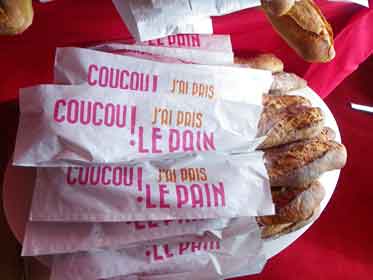I believe it is important to get pupils interested in grammar and make sure they understand what they are doing when they put words together. Learners are therefore more likely to produce correct language with a higher level of accuracy. It is more motivating and speeds up foreign language learning. However that approach can only work successfully if it is incorporated in the larger context of communicating in the foreign language. The teaching of grammar needs to be directly relevant, and that is one of the reasons why I always try to illustrate my grammar lessons with extracts from songs, advertising campaigns, newspaper headlines, film extracts, or any other authentic resource that catches my attention.
While on holiday last summer, I noticed that the paper used to wrap our daily baguette had the words Coucou, j’ai pris le pain! printed on it. Although that slogan looked innocuously short and simple, I knew I would be able to make good use of that wrapper with my pupils. A few weeks later, I showed it to a class, put the slogan up on the white board, and asked pupils to pair up and answer to the following questions:
1. Qu’est-ce que ça veut dire?
2. Où est le verbe?
3. Il est à quel temps?
4. Quel est l’infinitif de ce verbe?
5. Pouvez-vous deviner le contexte?
Not all students knew the meaning of coucou. Now they do; another item has been added to their list of greetings.
When we looked at pris and established it was the past participle of prendre, we spent a couple of minutes on efficient learning skills. My pupils are familiar with what I call the ‘three for the price of one’ policy; knowing how to conjugate prendre means they also know the conjugations of comprendre and apprendre.

When I asked them to rephrase j’ai pris le pain, pupils came up with j’ai volé le pain and j’ai attrapé le pain. It was logical and could have been correct in another context, but what I needed to hear was j’ai acheté le pain.
This led us to talk about cultural differences between France and Britain and the fact that most French people buy fresh bread every day and someone in the household has to get it on the way home from work or school. Coucou, j’ai pris le pain is likely to be the opening line of a mobile conversation between two people from the same household – or the content of an SMS – to make sure they don’t end up with three baguettes when they only need one.
What I liked about that short sentence printed on a flimsy piece of wrapping paper was the fact that it gave me the opportunity to integrate grammar into cultural awareness. One without the other would have been far less satisfying.
I have also used le petit pain au chocolat, a very old 1969 Joe Dassin song that contains loads of common verbs in the imperfect (achetait, regardait, était, voyaient, savait, rêvait, etc.) to illustrate that past tense. Despite its definitely retro flavour, pupils (boys and girls) usually start singing along without any prompting from me! A very good sign as I believe learners are more likely to remember key grammar if they were in a positive frame of mind during the lesson.
Marie-Thérèse Bougard


